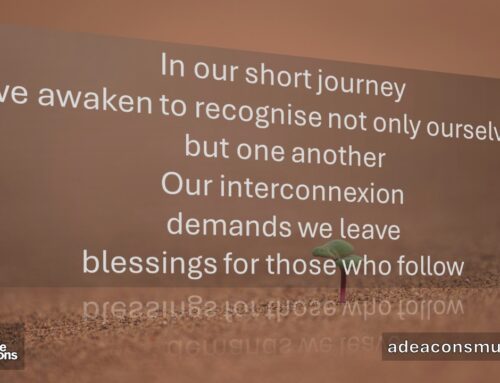Penance: it’s a concept or idea that does not have a lot of traction in the secular world. And – for those for whom there is some awareness – it can be a huge trigger, especially when connected with faith communities and Christianity in particular. It’s a fair challenge to acknowledge – and one which The United Church of Canada has known for a long time – that this old theological underpinning of Lent is symptomatic of how Christianity can be experienced as neither welcoming, nor loving. If anything, it reinforces a generational experience of church as a place of judgment and brimstone. Whether we’re even relevant is – of course – an entirely different conversation.
As someone who was neither churched growing up, or generationally predisposed to trusting institutions (need alone communities of faith) I totally get how penance is a word from which I would rather walk away. It’s just as important to recognise that even within the walls of this religious institution into which I have opted, it is a word that can polarise, just as much as confuse. I have also found that penance is important enough to explore – if I am going to find a way to translate its intention to those who might be seeking, doubting and journeying – in this adventure called life!
In last week’s Lenten blog – Intention – I tried to explore how the idea of prayer (another aspect of the season) might be understood as a practice of intention. And intention is an interesting way to connect the concept of penance. First of all, I think what is important for those for whom Lent might be new or about which you might want to know more, the meaning of penance (in its original Latin) connects with the idea of forgiveness (See a previous exploration of Lent & Forgiveness). I think that though forgiveness is often appreciated as being explicitly about the individual, it is fair to say it’s also about the Other, the Stranger or those from whom we have experienced hurt or pain, loss or grief. It’s not just about you or me, therefore, but our collective relationship and how we choose to interact with one another after we have done something for which we might regret or from whom we have experienced trauma.
The connexion, therefore, with forgiveness and intention – penance and prayer – is that the latter makes space for the former. Through a practice of intention, we might realise prayerfully the things we have done or acknowledge the difficult things we have experienced from others. As any faith system will encourage, however, recognition is not enough. Awareness becomes simply navel-gazing if action does not follow. With choice to change or grow, no amount of reflection by itself is actually transformative. And – should the Lenten journey be about actual internal and external (individual and corporate) change – looking into the mirror means that our feet must take us from where we’ve been to where we might be. And – I believe – that penance as an act of forgiveness begins to make some sense of the difficult term.
Making amends isn’t easy, forgiving is not done lightly, and asking for it can even be harder. And – what’s even more difficult – is that it may never be enough in a consumerised world of the quick fix, easiest pill to swallow, and the newest fashion to define who we are – even if momentarily. Central to Lent is how we prepare as leaders (disciples in Church-ese). The journey of faith that looks to Jesus as a model recognises that everyone is called to lead in their own way and context. And healthy leadership has to be reflective in order to learn from the past. Even more so, leadership has to be reflexive: to learn from those difficult moments means – often – doing something different in the moment when history might repeat itself.
Lent, I would offer, is about helping others shine, to be whole and heal. And – if we have not done that inner work ourselves – then we will likely be unable to do that. Intention and forgiveness, prayer and penance, are just a few practices that help us embrace the blessing that we are, in order for us to help others do the same.









If I weren’t so cowardly, I would share something about this blog, but I will only say that this blog is most meaningful for me personally.
The very fact that you have chosen to share a comment is – in itself my friend – courageous! Thanks for the sharing and affirmation that these words have been helpful!